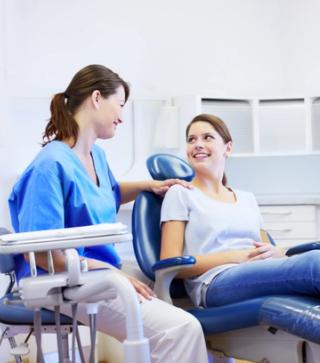Sleep Dentistry
Also known as IV Sedation, it is a technique of choice to treat anxious patients.

Sleep Dentistry is a technique that involves the intravenous administration of a sedative before dental work is performed. Also known as IV sedation, it is a technique of choice to treat anxious patients, or people who are nervous, fearful, or unable to tolerate the pain that is associated with some dental procedures.
When performed by a skilled dentist, it creates a pain-free dental experience that the patient is typically unable to remember when the procedure is finished.
Who can use sleep dentistry?
Sleep dentistry is an excellent option for patients who are anxious or afraid to visit the dentist. In general, there are three situations in which IV sedation is recommended:
- Patients who require procedures that are lengthy or complex
- Patients who tend to experience high levels of stress or fear about dental procedures
- Patients who have a low threshold for pain and with those who have a pronounced gag reflex
As with the case of any procedure, you should talk to your dentist about your specific situation and whether you are a good candidate for IV sedation.
The use of IV Sedation
While many dentists can administer nitrous oxide or minimal sedation, only a small number of dentists are trained to administer deep IV sedation. The Dental Board of Australia states that, "Only dentists, including dental specialists, whose registration is endorsed for conscious sedation can use this technique in their practice". Some of the medical and dental professionals who can perform sleep dentistry:
- Board endorsed conscious sedation dentists
- Dental anaesthesiologists
- General anaesthesiologists
The most important thing to remember when choosing a dentist to perform IV sedation is to ensure that the dentist has the proper qualifications to perform sedation dentistry.
Get in touch with our friendly team today to schedule an appointment.
Frequently asked questions
People often refer to IV sedation as twilight dentistry because it involves the use of a sedative that helps you relax before your dental procedure. Some IV drugs can put patients into a twilight-like sleep, in which patients feel tired and are less aware of their surroundings.
Here is a look at some of the other terms or nicknames given to IV sedation: Sleep Dentistry, Twilight Anaesthesia, Sedation Dentistry, Conscious Sedation
IV sedation can be performed in the comfort of a qualified dentist's office. As with the case of most dental procedures, you will be positioned in a comfortable dental chair when your sedative is administered and your dental work is performed.
At National Dental Care, we are pleased to have all of the patient monitors and IV equipment required to safely perform IV sedation.
There is no universal sedative used for IV sedation. Your dentist will evaluate your age, health history, and type of procedure you will receive before selecting a sedative to administer.
While trends may vary according to practice type and drug availability, there are several that are used more commonly than others. They include midazolam, diazepam (Valium), lorazepam (Ativan), and propofol.
No. When IV sedation is properly administered, you will not feel any pain during your procedure. You can expect your IV sedative to begin working in a matter of minutes, allowing your dentist to begin your dental work without you feeling any pain.
If your dentist numbs the area on your arm or hand where your needle is inserted, you may not even feel the small prick of the needle used to connect your IV tube.
When your procedure is completed and your dentist removes your IV, you may feel as if no time has passed. Most patients have no memory of their procedure or what transpired.

